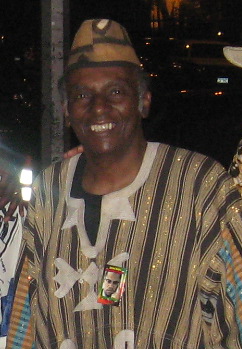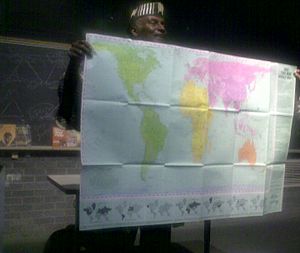Leonard Jeffries facts for kids
Quick facts for kids
Leonard Jeffries
|
|
|---|---|

Jeffries in 2010
|
|
| Born | January 19, 1937 Newark, New Jersey, U.S.
|
| Education | Lafayette College (BA) Columbia University (MA, PhD) |
| Occupation | Political scientist and academic |
| Spouse(s) | Rosalind Jeffries |
| Relatives | Hakeem Jeffries (nephew) Hasan Kwame Jeffries (nephew) |
| Scientific career | |
| Institutions | City College of New York San Jose State University |
| Thesis | Sub-National Politics in the Ivory Coast Republic (1972) |
Leonard Jeffries Jr. (born January 19, 1937) is an American political scientist and former professor. He was the head of the Black Studies department at the City College of New York (CCNY). He grew up in Newark, New Jersey. His nephews are Hakeem Jeffries, a leader in the U.S. House of Representatives, and Hasan Kwame Jeffries, a historian at Ohio State University.
Jeffries is known for his Pan-African and Afrocentrist ideas. These views emphasize the important role of African people in history. He believed that the achievements of African Americans are often underestimated. He also suggested that school lessons should focus less on European history and more on African history. He helped start the Association for the Study of Classical African Civilizations (ASCAC).
In the early 1990s, Jeffries made some statements that caused a lot of discussion. He claimed that certain groups were involved in the Atlantic slave trade and used the movie industry to harm Black people. He also spoke about "ice people" and "sun people." These remarks became widely known. Because of these comments, Jeffries was removed from his position as head of the Black Studies Department at CCNY. This led to a long legal case. In the end, the courts decided that the college had the right to remove him from that leadership role due to his controversial statements.
Contents
Leonard Jeffries's Education and Early Career

Leonard Jeffries went to Lafayette College for his first degree. He graduated with honors in 1959. After college, he received a special scholarship from Rotary International. This allowed him to study in Switzerland at the University of Lausanne. In 1961, he began studying at Columbia University. He earned his master's degree there in 1965.
While studying, Jeffries also worked for a program called Operation Crossroads Africa. This program allowed him to spend time in several African countries. These included Guinea, Mali, Senegal, and the Ivory Coast. By 1965, he became the program coordinator for West Africa. In 1969, Jeffries started teaching political science at City College of New York (CCNY). He earned his doctorate degree from Columbia University in 1971. His doctorate research was about politics in the Ivory Coast.
Leading Black Studies Programs
Jeffries became the first chairman of Black Studies at San Jose State College in California. A year later, he became a tenured professor at CCNY. This meant he had a permanent teaching position. He also became the head of CCNY's new Black Studies Department.
Jeffries led the Black Studies Department at CCNY for more than 20 years. He worked to bring in other scholars who shared his views. He also tried to increase the number of teachers and students in the department. During his time as chairman, the department hosted many important national and international events. Besides teaching and managing the department, Jeffries often traveled to Africa. He was also active in the African Heritage Studies Association. This group works to define and develop the field of Black Studies.
Jeffries became a popular speaker among students. He often spoke at colleges and other organizations. He was known for his Pan-African and Afrocentrist ideas. These ideas highlight the important role of African people throughout history. They also emphasize the achievements of African Americans.
Public Statements and Controversy
Jeffries supported the idea that greater skin pigmentation makes Black people naturally better than white people. He claimed that melanin, which gives skin its color, helps Black people "negotiate the vibrations of the universe." He also said it helps them "deal with the ultraviolet rays of the sun." Jeffries also stated that white people are "ice people" who are violent. He said Black people are "sun people" who are kind and peaceful.
In 1991, Jeffries gave a speech in Albany, New York. During this speech, he made claims about certain groups being involved in the Atlantic slave trade. He also claimed they were behind a plan in Hollywood to portray Black people negatively. These remarks were shown on television. They caused strong reactions from Italian and Jewish Americans.
Removal from Leadership and Legal Challenges
In 1992, Jeffries's term as department chair was first shortened. Then, he was removed from the position entirely. However, he was allowed to remain a professor at the college. He decided to sue the school. In August 1993, a jury found that his First Amendment rights had been violated. He was awarded money for damages.
The college appealed this decision. A federal appeals court agreed that his rights were violated but removed the money he was awarded. The college also created a new research center. This center was meant to do Black research independently from Jeffries's department.
In November 1994, the Supreme Court asked the appeals court to look at the case again. This was because of a related Supreme Court decision. In April 1995, the appeals court changed its decision. In June, a new professor was chosen to lead the department instead of Jeffries.
Discussion on Academic Freedom
Jeffries's case led to a lot of discussion about academic freedom and free speech. Academic freedom means professors can teach and research without unfair limits. Free speech means people can express their opinions.
One way to understand Jeffries's case is that universities cannot fire a professor just for their opinions. However, they might have more flexibility with leadership roles, like a department chair. Another view is that public institutions can discipline employees for speech that causes major problems.
Works and Contributions
Jeffries worked as a consultant for the State of New York. In this role, he helped create a document called "A Curriculum of Inclusion." This document suggested changing school lessons. It called for including more about African, Asian, and Latino families in the curriculum.
 | Anna J. Cooper |
 | Mary McLeod Bethune |
 | Lillie Mae Bradford |

